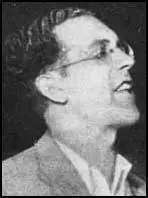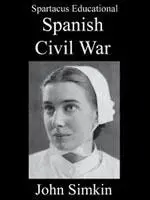Jesus Hernandez

Jesus Hernández was born in Spain in 1906. He held left-wing political views and in his youth he joined the Communist Party (PCE). Hernández was later to admit that he took part in a failed assassination attempt on the life Indalecio Prieto, one of the leaders of the Socialist Party (PSOE).
On the outbreak of the Spanish Civil War Hernández was editor of the communist newspaper, Mundo Obrero. In September 1936, President Manuel Azaña appointed the left-wing socialist, Francisco Largo Caballero as prime minister. Largo Caballero brought into his government two communists Hernández (Education) and Vicente Uribe (Agriculture).
Hernández, a strong opponent of the anarchists, spent the next few months trying to persuade Largo Caballero to bring the Anarchist Brigades under the control of the Nationalist Army. During the May Riots in Barcelona Hernández argued that Worker's Party (POUM) should be outlawed. When Largo Caballero refused, he helped to force the prime minister to resign.
As Minister of Education he played an important role in promoting the government's literacy campaign. In April 1938 Hernández became head of the war commissars in the central zone. According to Edward P. Gazur, the author of Alexander Orlov: The FBI's KGB General (2001): "As with the Central European Soviet satellites, it would have been only a matter of a short time before the Communists had taken over the Spanish Government. The logical candidate to run the new Soviet satellite would have been Jesus Hernandez, the Minister of Education in the Republican Cabinet during the war. Hernandez was a member of the Spanish Communist Party as well as a leading member of the Comintern and would therefore be expected to do the bidding of the Soviets as their puppet in power."
In 1939 Hernández fled to the Soviet Union and became an executive member of Comintern. He soon became disillusioned with the rule of Joseph Stalin and went to live in Mexico. In his memoirs published in 1953, Hernández admitted that he was following orders from Stalin to oust Francisco Largo Caballero and to get him replaced by Juan Negrin. He also claimed that Stalin did not really care about the Republicans winning the Spanish Civil War and was more concerned with blocking German influence in the country.
Hernández also gave evidence against Alexander Orlov who he accused of being responsible for the death of Andreu Nin, the leader of the Worker's Party (POUM). Nin was tortured for several days: "Nin was not giving in. He was resisting until he fainted. His inquisitors were getting impatient. They decided to abandon the 'dry' method. Then the blood flowed, the skin peeled off, muscles torn, physical suffering pushed to the limits of human endurance. Nin resisted the cruel pain of the most refined tortures. In a few days his face was a shapeless mass of flesh."
Jesus Hernández died in 1966.
Primary Sources
(1) Jesus Hernandez, The Country of the Big Lie (1973)
Nin was not giving in. He was resisting until he fainted. His inquisitors were getting impatient. They decided to abandon the 'dry' method. Then the blood flowed, the skin peeled off, muscles torn, physical suffering pushed to the limits of human endurance. Nin resisted the cruel pain of the most refined tortures. In a few days his face was a shapeless mass of flesh.
(2) Edward P. Gazur, Alexander Orlov: The FBI's KGB General (2001)
When he (Alexander Orlov) was dispatched to Spain in 1936, he was under orders not to undermine or interfere with the political activities of the Socialist Government of the Republicans and, if necessary, to yield to its demands. Although the Republican Government was by far dominated by members of the Socialist Party, there was a small vociferous contingent of Communist Party members in it. Orlov's orders were clear that he should show no partiality towards the Communist Party members. The first priority was to win the war in Spain with everything focused towards this end, the rationale being that the remaining issues would fall into place following the war. Hitler and Mussolini contrived to have a united Europe of Fascist governments and colonies while Stalin, the most megalomaniac of them all, conceived his plan on a more grandiose scale, to spread Communism throughout the world. By the time Stalin died in 1953, he was well on his way to achieving his goal and his masterplan was perpetuated by his successors in the Kremlin. The Soviets already had a foothold in Spain during the Spanish Civil War and a Republican victory would have assured their continued presence by a government that would have owed much gratitude to the Soviets for their aid during the war. Orlov was given to believe that, following hostilities, he would no longer have to placate the Spanish Socialist Party and all efforts would be directed towards gradually placing the Spanish Communist Party in power with an eventual takeover of the Spanish Government by the Communists. During the Spanish Civil War, the Soviets were already grooming Spanish nationals in the Comintern (the Soviet's international apparatus for Communist Parties around the world) for the task. Orlov admitted that when he first went to Spain in 1936, he wholeheartedly supported the plan but in time realised that the Republicans could not win the war.
With this background in mind, Orlov conjectured that Spain would have gone the way of Hungary, Poland, Czechoslovakia, East Germany and the other Soviet satellites behind the Iron Curtain, only at a much earlier time. As with the Central European Soviet satellites, it would have been only a matter of a short time before the Communists had taken over the Spanish Government. The logical candidate to run the new Soviet satellite would have been Jesus Hernandez, the Minister of Education in the Republican Cabinet during the war. Hernandez was a member of the Spanish Communist Party as well as a leading member of the Comintern and would therefore be expected to do the bidding of the Soviets as their puppet in power. He was also an antagonist of Orlov's.
Orlov also projected that had the Soviets taken over Spain, history may have taken an entirely different route. Spain's strategic location ensured control of the Mediterranean Sea from where Communism would have easily spread along the Mediterranean basin. Hitler would have had to rethink his aggressions in Europe with the Soviets on both of his flanks, and undoubtedly there would have been countless possible scenarios and alliances between the Great Powers that would provoke the imagination. The potential to change the course of history was so complex that Orlov was unwilling to speculate further.

